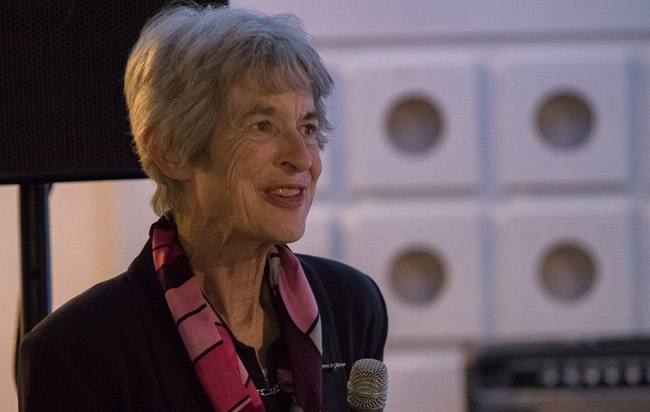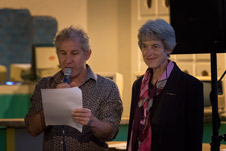
Emeritus Professor Carolyn Burns was awarded the prestigious 2017 Marsden Medal by The New Zealand Association of Scientists (NZAS) last month. Photos: Carl Anderson.

The Co-President of The New Zealand Association Scientists (NZAS) Craig Stevens announces Emeritus Professor Carolyn Burns' Marsden Medal.
The Otago recipient of the 2017 Marsden Medal says passion is required to sustain a career in science.
Emeritus Professor Carolyn Burns, an Otago zoologist who is internationally renowned for her research into freshwater ecology, was last month awarded the prestigious 2017 Marsden Medal by The New Zealand Association of Scientists (NZAS).
The medal recognised Emeritus Professor Burns' tireless contributions to the New Zealand research, science, and tertiary education communities.
She spoke to the Otago Bulletin Board about freshwater ecology, the medal, and what it takes to forge a successful scientific career.
1. How did you get into the field of freshwater ecology?
I grew up at Lincoln, near Christchurch and can recall being fascinated as a child by the organisms living in the ditch that ran past our house. Later, as an undergraduate student at the University of Canterbury, my interest in aquatic environments was stimulated through courses and field trips to freshwater and marine environments – lakes, ponds, rivers, estuaries and seashores. By the time I had completed my BSc (Hons) degree, I knew I wanted to carry on with research in aquatic environments, in particular on the planktonic organisms that live in the upper waters of lakes and the sea. However, I chose fresh water rather than the sea for two reasons: I would have had to rely on trips offshore with local fishermen to carry out research on marine plankton (there were no marine research vessels at this time) and I wanted to have more control over my research; I'd also realised that although New Zealand has abundant freshwater resources, most of this water is inaccessible, or would be difficult and costly to access relative to the location of our major population centres and our agricultural needs. As maintenance of the quality and quantity of our accessible fresh water was likely to become more important in the future with growth in our population and agricultural economy, I decided to pursue my research interests in fresh waters.2. What do you love about this field?
New Zealand's freshwater ecosystems have a strong aesthetic and cultural appeal for many people and, for me, our lakes, wetlands, rivers and streams are part of what it is “to be a New Zealander”. So, I've always felt privileged to be able to work in these dynamic ecosystems. I love the way they are constantly changing physically and biologically in response to internal and external drivers – weather, land development, seasons, etc., and increasingly also now by climate change and invasive species. Every answer in freshwater ecology raises new questions and new challenges. In particular, I love the challenges raised by the microscopic organisms in the plankton whose role in freshwater ecosystems worldwide has largely been overlooked until relatively recently, yet they underpin open water food chains and often have significant effects on water quality.3. What are some of the things you are most proud of within your research work?
There is no single research finding or outcome of which I am most proud, but I am pleased to have been able to elucidate, quantify and model aspects of the roles of tiny shrimp-like crustacean zooplankton (Daphnia, copepods) in the food webs of lakes, in particular their effects on water quality and lake productivity, through my research over the years. I'm also very proud of some of my research students several of whom have continued to work in this area of research in New Zealand and overseas.4. Your citation mentions your work on many boards – why are those contributions important to you?
I have appreciated the opportunities to work on various boards and councils concerned with research, conservation and protection of the natural environment (e.g. NIWA, Antarctica New Zealand, Nature Conservation Council, National Parks and Reserves Authority) and have enjoyed these experiences. I'm very interested in the research that is carried out by, or facilitated by, these organisations and I'm keen to ensure that the research of high quality proposed in the organisations' strategic and business plans, can be carried out. I'm also keen to raise public perception and acknowledgement of the value of science and scientists in New Zealand. Through various activities associated with these boards I hope I have been able to contribute in a small way to raising appreciation of science in New Zealand. However, I also get considerable pleasure when an organisation succeeds in research and management programmes that the board has approved.6. What does it mean to you to receive the 2017 Marsden Medal?
In addition to its awards for achievement in science, the New Zealand Association of Scientists (NZAS) serves a useful role as an outlet for the views of scientists on issues of national relevance and importance relating to science. Acknowledgement by one's peers in science is the ultimate accolade and I feel enormously privileged to be honoured in this way with the award of the 2017 Marsden Medal. I'm particularly grateful to my nominees who considered me worthy of this award.7. You are now an Emerita Professor – what are you up to?
Although I am now an Emerita Professor – another acknowledgement that I feel privileged to have been awarded – my curiosity and enthusiasm for science have not waned and I'm pleased to be able to continue some research, co-supervise a few postgraduate students and contribute to various Departmental and University activities and committees. I'm also a member of the Marsden Fund Council and convene the Ecology, Evolution and Behaviour panel to consider applications for grants in these areas. When I'm not at the University you might find me on the tennis courts, tending my garden (which seems to be in constant need of pruning and weeding), at concerts, conferences, seminars, public lectures or reading in my sun-drenched conservatory. Twice a year for the past nine years I have travelled overseas for two to three weeks to experience and learn about the landscapes, climates, flora, fauna and people – their cultures, histories and legacies – that inhabit our wonderfully diverse planet.8. Any advice for other researchers?
Unless you are passionate about research in science it is, like most other endeavours such as teaching, writing, performance art (e.g. painting, violin) or sport, probably not worthwhile committing to a career in science. You need the passion to sustain your interest and perseverance through times of failure, inadequate or no funding for your research, rejection of your findings, disruption to your projects, and other 'stumbling blocks'. However, if you are passionate about your research, you can and will achieve your goals and enjoy your successes. For me, a university academic position has provided an ideal opportunity to pursue my love of scientific research while at the same time passing on my enthusiasm, knowledge and curiosity about aspects of Earth's ecosystems and biota to students and staff through my teaching. I couldn't have chosen a better career!